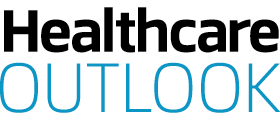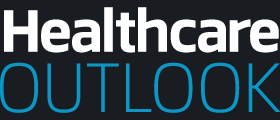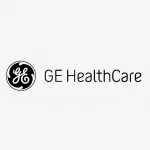Dr. Lawrence Rosenberg, President and CEO of CIUSSS West-Central Montreal, details the network’s extensive digital healthcare transformation as technologies accelerate the industry transition.
COMPLETE QUEBECOIS CARE
Health is very personal, not just for me, but for everyone.”
As President and CEO of the Integrated Health and Social Services University Network for West-Central Montreal (CIUSSS West-Central Montreal), Dr. Lawrence Rosenberg leads the healthcare transformation across Quebec.
There is much to do in the province, with many needs to fill and problems to solve amid a period of transition and turmoil in the industry.
This is partly because current healthcare systems are no longer sustainable in the way they were originally conceived, especially in Canada, due to the growing needs of aging populations and the increase in chronic illnesses.
“We have the opportunity to do things differently; I think that’s where the excitement is,” Rosenberg notes.
Ensuring continuity of care and services to the public is always the top priority for CIUSSS West-Central Montreal and its 14,000 employees, who are committed to providing timely access to a seamless continuum that focuses on the particular needs of individuals.
Healthcare in Canada is primarily a provincial jurisdiction, and the network was created by an act of legislation in 2015 that fused 10 previously independent healthcare and social service organizations in Western and Central Montreal.
Today, it has 34 sites across the region spearheaded by the Jewish General Hospital (JGH), one of Quebec’s largest and busiest acute care and teaching hospitals.
Serving as the hub of the CIUSSS West-Central Montreal network, JGH is complemented by five local community services centers (CLSCs), five rehabilitation centers, seven long-term care sites, two day centers, and several affiliated research facilities.
“We really run the gamut from birth to death across our territory,” acclaims Rosenberg.
“Officially, we’re responsible for about 365,000 citizens, but in practice, we probably look after closer to 770,000 people because a lot of patients come from outside our territory specifically to access the care that we provide.”
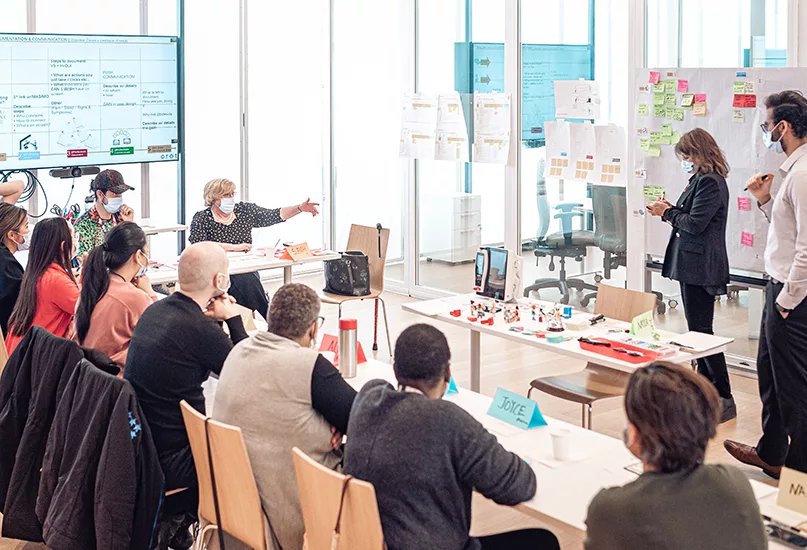
DIGITAL HEALTHCARE TRANSFORMATION
Canada’s healthcare industry transition has also been accelerated by the rapid evolution of digital technologies such as generative artificial intelligence (AI), which will undoubtedly begin to impact, if not outpace, traditional healthcare systems.
The digital transformation now being undertaken by some of the world’s leading healthcare institutions, including CIUSSS West-Central Montreal, will result in a significant rethink of the underlying foundations of conventional medicine.
Indeed, a paradigm shift is well underway, with digital health and AI rapidly becoming inseparable from providing best-practice healthcare and social services.
CIUSSS West-Central Montreal introduced its own digital healthcare transformation program in 2019, just before the start of the COVID-19 pandemic.
The strategy resulted from a thoughtful internal exercise looking at the direction of health and healthcare delivery over the next decade, and what the network needed to do differently in order to enhance the value it delivers to the population.
“The pandemic was an opportunity to implement things faster than we otherwise would have been able to,” Rosenberg tells us.
In a first for Quebec, CIUSSS West-Central Montreal deployed Microsoft’s mixed-reality HoloLens in several long-term care facilities during the pandemic to help connect staff virtually and reduce their exposure to the virus.
“We were also faced with the conundrum of trying to scale up the amount of critical care patients we could safely look after during the beginning of the pandemic, so we applied the HoloLens in those instances to allow for extended medical coverage,” he adds.
CIUSSS West-Central Montreal has since deployed the technology further in its long-term care, home care, and frontline services, as well as its neonatal intensive care unit.
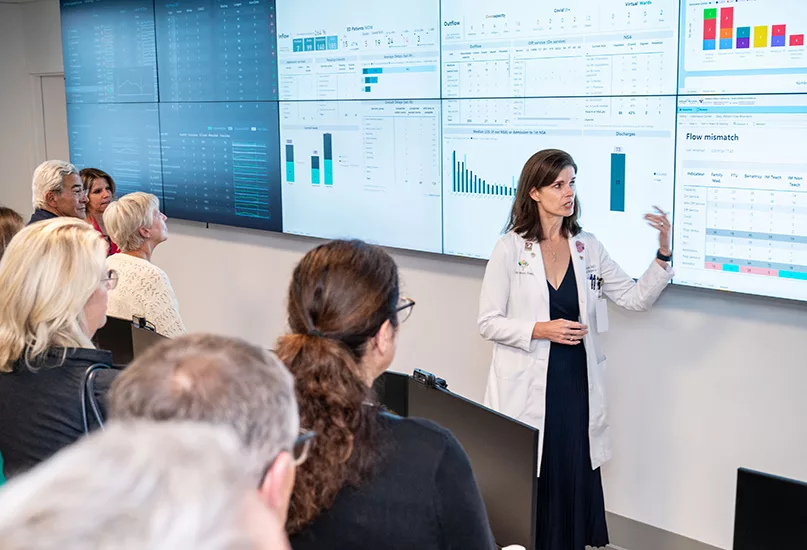
REMOTE MONITORING
A number of pillars underlie the digital healthcare transformation program, the first of which is cybersecurity, something that CIUSSS West-Central Montreal has invested heavily in over the last six years.
Second is a command center that was set up during the pandemic, which gave real-time visibility across the entire territory in all of CIUSSS West-Central Montreal’s institutions, helping significantly with patient flow from one facility to another.
“As an extension of the command center mandate, we introduced our Hospital@Home program, which is now a little over two years old,” Rosenberg elaborates.
Hospital@Home enables certain patients who otherwise would have remained in the hospital to continue their care at home.
Patients are monitored by digital devices that are linked to CIUSSS West-Central Montreal’s virtual care team, with the frequency of monitoring adjusted according to their needs.
Care is provided by a multidisciplinary team of doctors, nurses, and other healthcare professionals who combine their hospital and community expertise.
In effect, the patient’s home is transformed into a virtual hospital until they can be safely discharged from the program. Remote monitoring is carried out through two different continuous monitoring devices that allow patients to be observed 24/7.
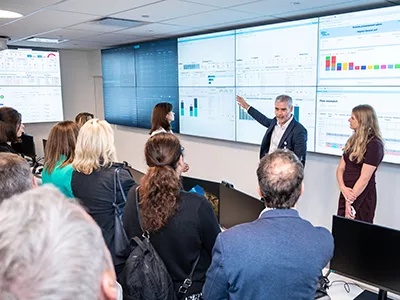
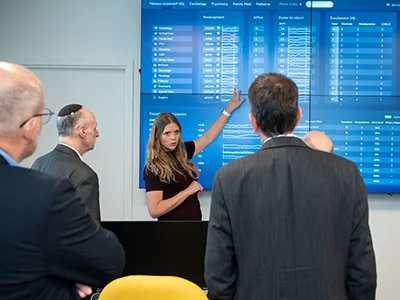
“Hospital@Home has been a very significant introduction with respect to how and where we care for our patients,” Rosenberg emphasizes.
“The whole notion behind our digital health transformation strategy is predicated on our vision of ‘Care Everywhere’, which is something we’ve branded over the last two or three years. The Hospital@Home program is the jewel in the crown of what we’ve done.”
To safely look after patients at home and receive information as quickly as possible to inform medical decisions, CIUSSS West-Central Montreal has also deployed point-of-care testing.
“Our home care nurses can go into the home, obtain results within 15 minutes, and forward them back to the physicians who then make decisions about care planning. This is something that is quite innovative in Quebec; no other sites have deployed this type of technology,” states Rosenberg.
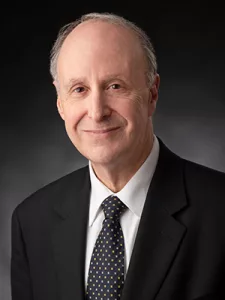
“Hospital@Home has been a very significant introduction with respect to how and where we care for our patients”
Dr. Lawrence Rosenberg, President and CEO, CIUSSS West-Central Montreal
OPPORTUNITIES FOR INNOVATION
Meanwhile, CIUSSS West-Central Montreal is still in the process of expanding its focus on data science and AI as part of its digital transformation.
“We recognize that patient medical information is really the currency in which we trade, so we needed to improve our electronic healthcare record (EHR), which is fairly legacy and well beyond its shelf life,” outlines Rosenberg.
Therefore, around four years ago, the decision was made to partner with a Canadian software company to design and develop a next-generation connected health record (CHR).
The first part of the platform, the patient trajectory dashboard, was successfully rolled out in November 2023.
“For the first time, we now have a view of our patients across all of the facilities in our network in real time,” Rosenberg informs us.
“There actually isn’t a comparable software platform in the country at this point in time. The full CHR roll-out will be completed about 14 months from now.”
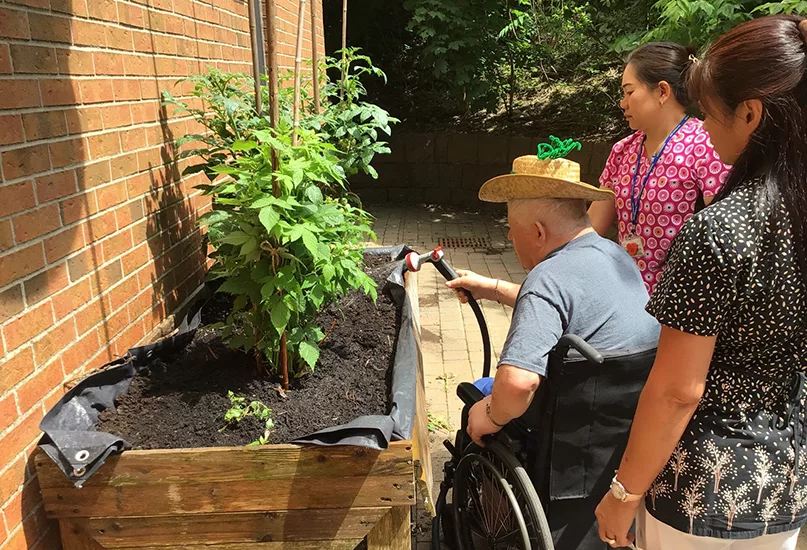
Given the pace of change in the healthcare industry, it was also clear that the network needed a central coordinating body to identify and capture opportunities for innovation.
CIUSSS West-Central Montreal therefore created its own Connected Health Innovation Hub, OROT, bringing together clinicians and end users with entrepreneurs and innovators in order to build and launch technologies that improve people’s lives.
“OROT has been wildly successful and brought us an entirely different level of national and international recognition,” prides Rosenberg.
“The Connected Health Innovation Hub has won a number of prizes and is funded both internally by our hospital foundation and externally by government grants and contracts.”
CIUSSS West-Central Montreal and JGH have likewise received innumerable Employer of the Year and Employer of Choice awards over the course of the past decade, a source of pride as it looks ahead to future targets and priorities.
“From an innovation point of view, we’re still looking to scale our virtual care programs. The introduction of AI is going to be a major preoccupation across the organization, not just for things related to operations but also in clinical decision-making. We’re trying to build an AI team in order to make sure that we do this in an appropriate and efficient way,” Rosenberg concludes.
